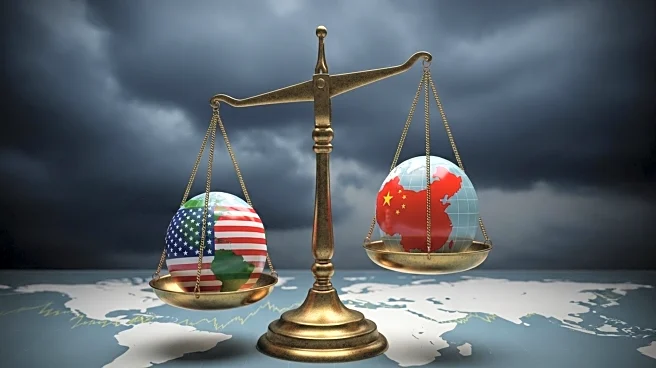What is the story about?
What's Happening?
The Tel Aviv Stock Exchange experienced a downturn as renewed U.S.-China trade tensions affected global markets. The TA-35 index dropped 2% at the open, later trimming losses to 1.3% by midday. Technology stocks led the declines, with the TA-Technology index falling 2.5%. This market reaction followed President Trump's announcement of a 100% tariff hike on Chinese exports, responding to China's decision to restrict exports of rare earth minerals. These minerals are crucial for global tech manufacturing. Trump also threatened new export controls on aircraft and parts. His comments led to significant losses on Wall Street, with the S&P 500 falling 2.7%, the Dow Jones Industrial Average dropping 1.9%, and the Nasdaq sliding 3.6%. Investors shifted to safe-haven assets like gold and U.S. Treasury bonds, while the U.S. dollar weakened against major currencies.
Why It's Important?
The escalation in trade tensions between the U.S. and China has significant implications for global markets and industries reliant on rare earth minerals. These minerals are essential for manufacturing technology products, and restrictions could disrupt supply chains, affecting tech companies worldwide. The tariff hike and potential export controls could further strain U.S.-China relations, impacting international trade dynamics. Investors' move towards safe-haven assets indicates uncertainty and potential volatility in financial markets. The weakened U.S. dollar could affect international trade balances and currency markets. Companies involved in tech manufacturing and export may face increased costs and operational challenges, influencing their financial performance and strategic decisions.
What's Next?
The ongoing trade tensions may lead to further retaliatory measures from China, potentially exacerbating the situation. Stakeholders, including political leaders and businesses, will likely monitor developments closely, assessing impacts on trade policies and economic strategies. Companies may need to explore alternative supply chains or adjust pricing strategies to mitigate the effects of tariffs and export restrictions. Financial markets may continue to experience volatility as investors react to new developments. The situation could prompt discussions on international trade agreements and policies, influencing future negotiations between the U.S. and China.
Beyond the Headlines
The trade tensions highlight the geopolitical complexities of international commerce, where economic decisions are intertwined with political strategies. The reliance on rare earth minerals underscores the need for diversified supply chains and sustainable resource management. The situation may prompt discussions on technological innovation and alternative materials to reduce dependency on specific resources. The broader implications for global trade relations could influence future diplomatic engagements and economic collaborations between major economies.















